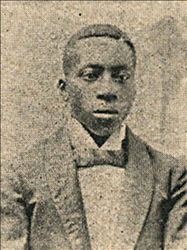Arthur Marshall (composer) facts for kids
Quick facts for kids
Arthur Marshall
|
|
|---|---|
 |
|
| Background information | |
| Birth name | Arthur Owen Marshall |
| Born | November 20, 1881 Saline County, Missouri, U.S. |
| Died | August 18, 1968 (aged 86) Kansas City, Missouri, U.S. |
| Genres | Ragtime |
| Occupation(s) | Composer, pianist |
| Instruments | Piano |
Arthur Owen Marshall (born November 20, 1881 – died August 18, 1968) was an American composer and pianist. He was known for his ragtime music.
Contents
Early Life and Learning
Arthur Marshall was born on a farm in Saline County, Missouri, on November 20, 1881. His mother, Emily Marshall, worked as a washerwoman, meaning she washed clothes for others. His father, Edward Marshall, did not have a clear job.
A few years later, his family moved to Sedalia, Missouri. They moved because Black children there could go to school for nine months a year. In other places, they could only attend for three months. People in Sedalia were also said to be more welcoming to African Americans.
Marshall went to elementary school in Sedalia. He was only 15 years old when the famous musician Scott Joplin came to town. Joplin lived with the Marshall family. Soon, Marshall and his classmate, Scott Hayden, became Joplin's students. Marshall had already taken some piano lessons. He knew how to play the piano well and had a natural talent for syncopation, which is a special rhythm that makes music sound bouncy.
Joplin also helped Marshall get a job at the Maple Leaf Club in 1899. One day, Marshall had a disagreement at the club. This led to a conflict, and he decided to leave the club and the town soon after.
Music Career
Scott Joplin suggested that Marshall keep studying music. So, Marshall went to George R. Smith College to learn music theory, which is about how music is put together. He graduated with a teaching license. However, he chose to become a performer instead. He became known as a great local musician.
While still in college, he traveled with McCabe's Minstrels for almost two years. This was a traveling music and performance group. He played the piano during their breaks. Marshall also earned money for school by playing ragtime music in public places. He played for dances and special events.
From 1901 to 1902, Marshall lived in the Joplin home in St. Louis. Other musicians like Scott Hayden also lived there.
Marshall continued to play in different tours and music contests. He played in St. Louis and places like Chicago. In 1903, he worked at the Louisiana Purchase Exposition (the St. Louis World's Fair). He played piano at the Spanish Cafe, earning $12 a week plus tips. He faced challenges there because of racial unfairness. After 1905, he moved to Chicago with his wife. He played at several local spots there.
Marshall worked with Scott Joplin on two ragtime songs. These were "Swipesy Cake Walk" (from 1900) and "The Lily Queen" (from 1907). He also created several songs by himself. These included "Kinklets," "Ham and !," and "The Peach." For these three solo songs, Marshall received $50 and small payments for each copy sold from his publisher, John Stillwell Stark. He felt this was a fair deal.
Later Life and Passing
Marshall stopped working in the music business in 1917. However, later in his life, he took part in events that brought ragtime music back into popularity. Arthur Marshall passed away in Kansas City, Missouri.
Family Life
Arthur Marshall was married four times during his life.
- Latisha (or Letitia) Howell, around 1904 in St. Louis.
- Maude McMannes, in St. Louis.
- Julia Jackson, in Chicago. They had three children together: two girls (one named Mildred Steward) and one boy. Julia died in 1916.
- Odell Dillard (Childs), in Kansas City on November 25, 1919.
List of Compositions
| Title | Year | Comments |
|---|---|---|
| "Swipesy Cakewalk" | 1900 | With Scott Joplin |
| "Kinklets" | 1906 | |
| "Lily Queen" | 1907 | By Marshall, edited by Joplin |
| "Missouri Romp" | 1907 | |
| "Ham and !" | 1908 | |
| "The Peach" | 1908 | |
| "The Glory of the Cubs" | 1908 | |
| "The Pippin" | 1908 | |
| "Silver Arrow Rag" | 1949 | |
| "National Prize Rag" | 1950 | |
| "Century Prize" | c. 1966 | |
| "Silver Rocket" | c. 1966 | |
| "I'll Wait Until My Dream Girl Comes Again" | 1974 | Published after he died |
| "Little Jack's Rag" | 1976 | Published after he died |
| "The Miracle of a Birth" | 1980 | Published after he died |
See Also
- List of ragtime composers
 | Isaac Myers |
 | D. Hamilton Jackson |
 | A. Philip Randolph |

